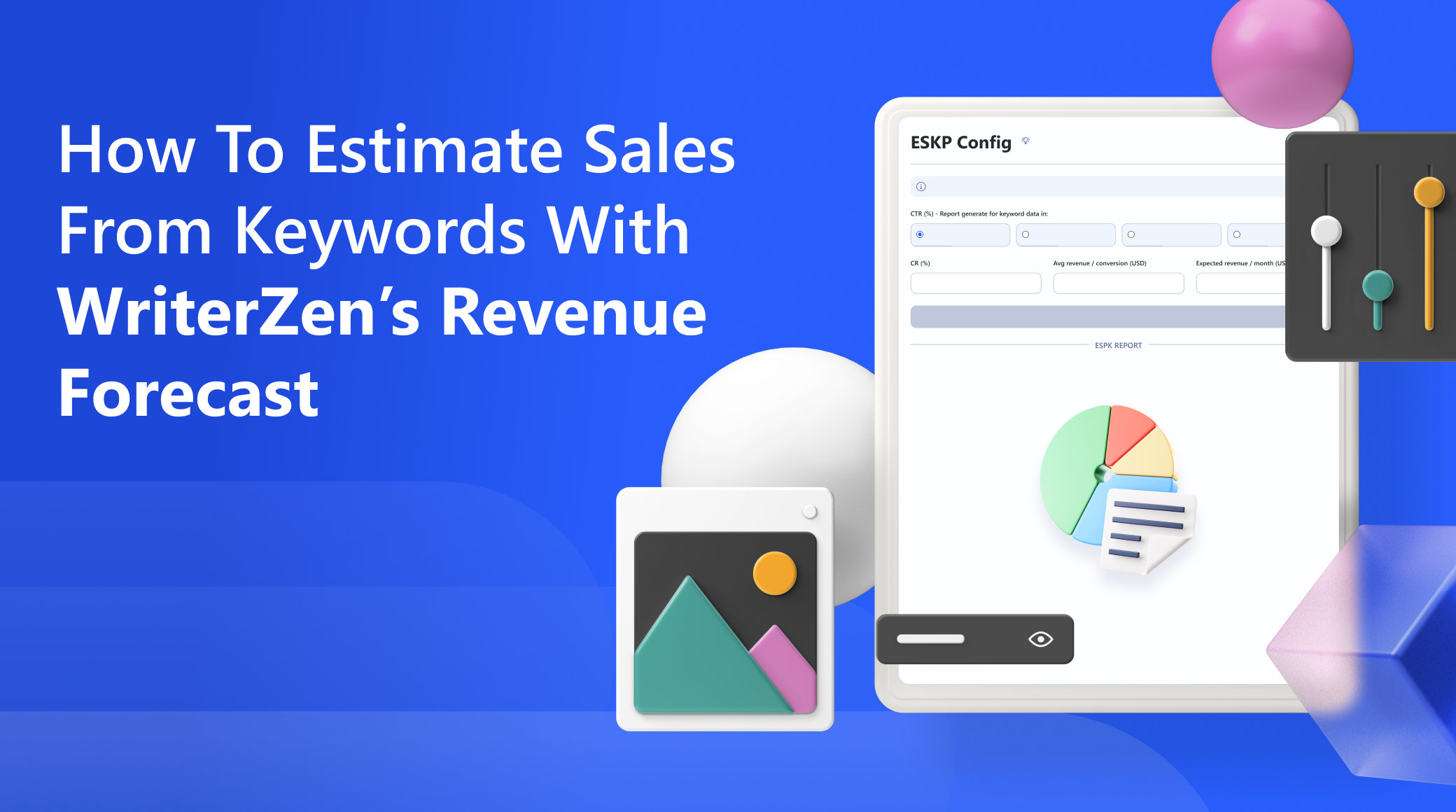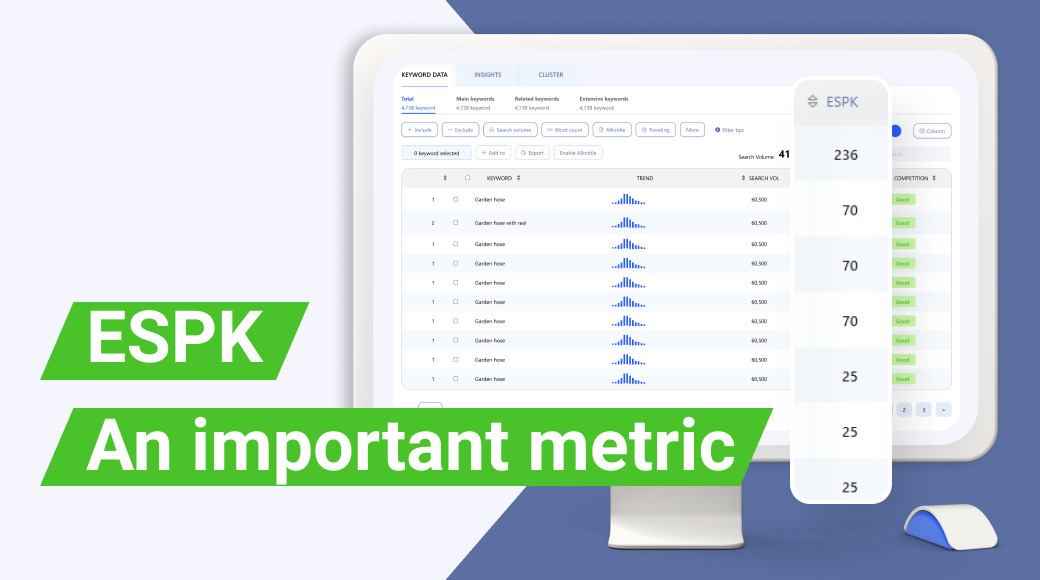Many years ago, when monarchs ruled the world, everyone —including powerful kings—revered a certain group of people.
They were none other than seers.
Seers were highly-sought members of the elite who contributed to all facets of ancient society. They decided who became kings, settled disputes, and counseled kings on decisions that could make or break their cities.
For example, armies never went to war or laid siege without consulting a seer. And the idea behind these consultations was to avoid calamities.
Although seers aren’t as prominent as they were in ancient times, the idea of forecasting before taking action is still a thing.
Imagine founders and search marketers in general borrowed this technique from ancient times. Don’t you think your content marketing efforts would yield more results?
Say you wanted to run a Google Ad campaign.
And while researching keywords, you not only found easy-to-rank phrases. But you could also forecast how much you’d make from them if they ranked in certain SERP positions like a seer would.
Wouldn’t that help you play your cards right?
Ken Lyons, Co-Founder of Measured SEM, agrees:
“Running these sort of forecasts will help you predict the potential profitability of your target keyword verticals, which should help you or your client make a more informed business decision about where to invest capital.”
Forecasting keyword revenue gives you a financial projection for your paid ads or SEO campaign. It’s something businesses do to invest their money wisely.
If you forecast revenue while researching keywords, you won’t just get content pieces that make it to SERPs. Your articles will also generate revenue just as they rank.
That’s because you’ll determine the sales potential of any keyword before investing in them.
As this WriterZen user does:
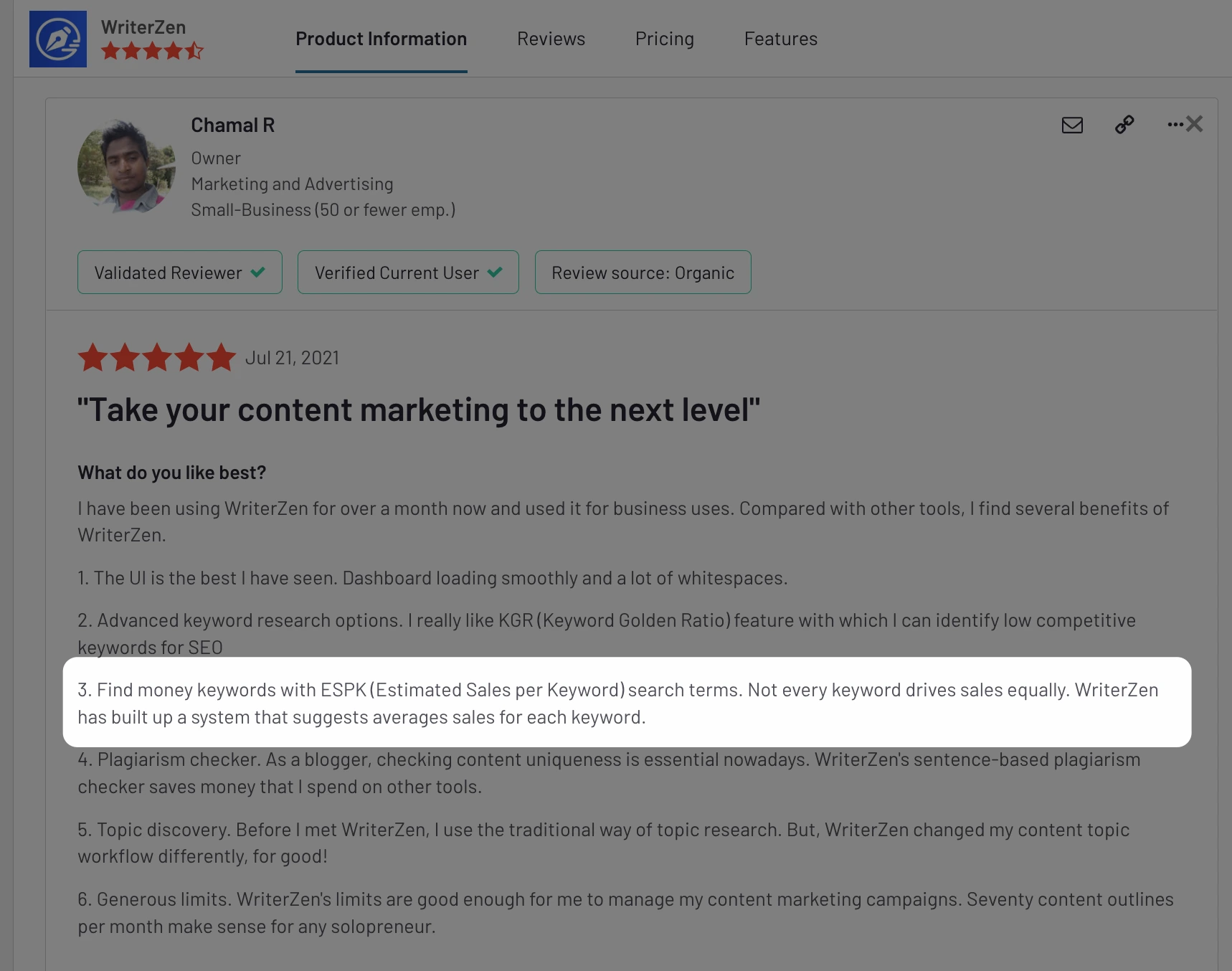
WriterZen review on G2
This guide will walk you through everything about forecasting keyword revenue. Also, you’ll see how others (like the reviewer above) estimate sales from a keyword’s ranking position using WriterZen, a simplified content workflow software.
Why Forecast Revenue from Keywords?
According to Wishpond, over 1.2 million businesses worldwide rely on Google search and ads to market their products and services.
If you’re one of them, you must be keen on making profits.
However, it all boils down to the keywords you target.
Ben Maden, Web Consultant at Matter Solutions, opines:
“Keyword research is one of the most important aspects of any SEO campaign. After all, if it’s undertaken correctly, it can result in a significant amount more of traffic, conversions, and sales.”
Choosing the right set of keywords affects your ad or SEO campaign.
But when researching these keywords, most marketers rely on metrics such as search volume, keyword difficulty, CPC, or long-tail keywords with reasonable conversion rates.
These are good metrics, no doubt, but they don’t answer what a founder yearns to know:
"How much revenue will these keywords fetch if they rank in top SERP positions?"
Fail to answer this question when researching keywords, and you’ll eventually lose money and time, even if your target keywords rank highest.
And that’s why forecasting keyword revenue potential is crucial.
It helps you:
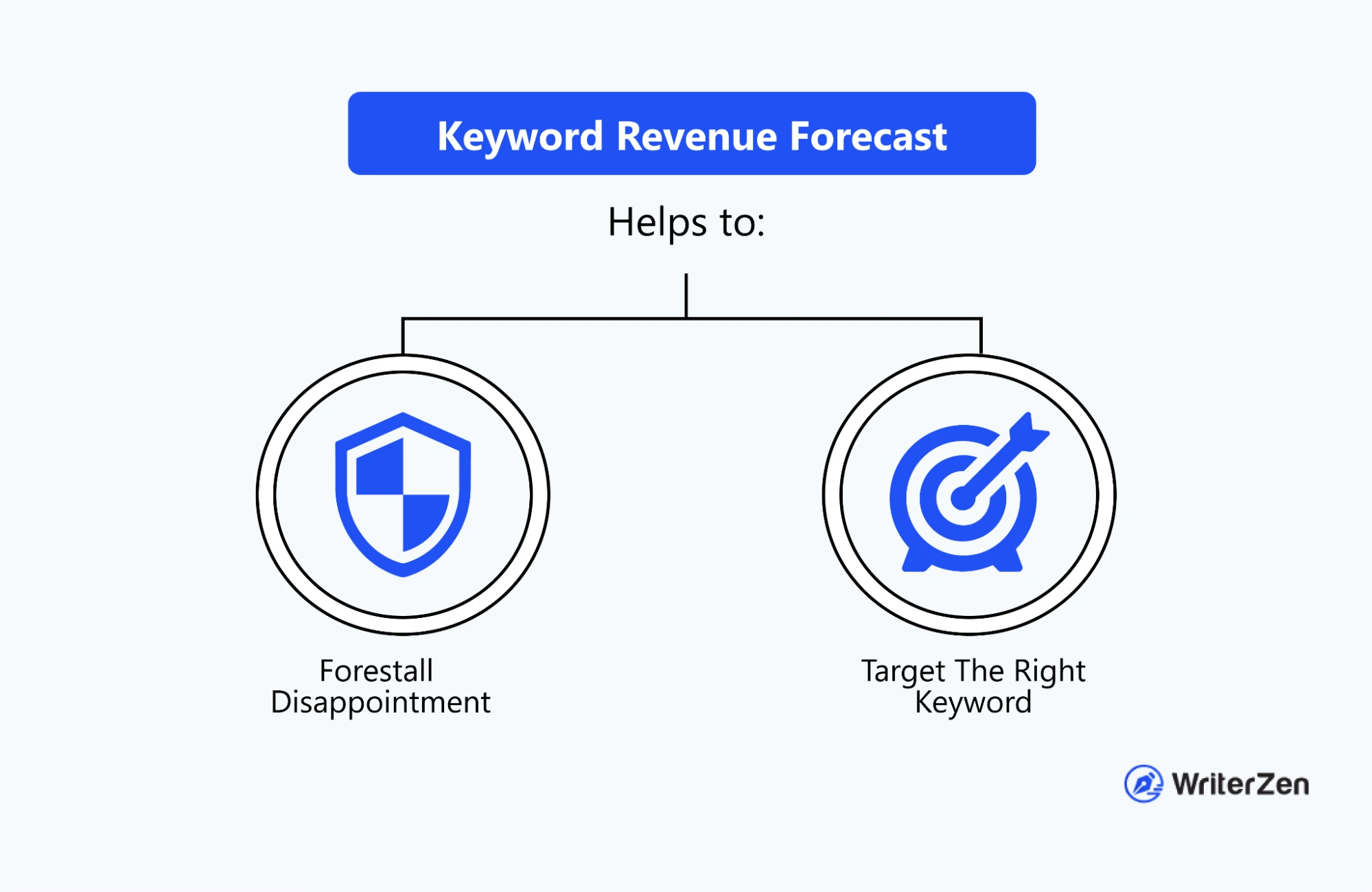
Forestall Disappointment
Say you checked your keywords' search volume and saw it has a high demand. Then you checked their keyword difficulty scores to ensure they were easy to rank before targeting them.
Unfortunately, after investing time and resources in targeting those keywords, all you get is traffic.
No qualified leads. No orders. No profit.
You may have expectations about ranking for certain keywords only to get disappointed when they bring in traffic but don’t meet your revenue targets.
But when you estimate profits while doing keyword research, you get a realistic expectation of your SEO ROI and avoid getting disappointed.
Hear it from iPullrank:
“While forecasting may not provide 100% accuracy, it can provide a glimpse of what to expect from SEO efforts. And at times, the forecast results can save many future headaches.”
Do this often, and you’ll always…
Target the Right Keywords
By forecasting SEO ROI from keyword positions, you’ll eventually target the right keywords that suit your SEO content strategy and revenue goals.
How, you ask?
Since you’ll have a realistic expectation of your SEO efforts, there’ll be no need for trial-and-error campaigns.
From forecasting, you’ll see keywords that may or may not meet your revenue goals and drop them without wasting your time and energy.
Take WriterZen users.
Instead of expending their energy targeting just any keyword, they leverage our software to find fast-ranking keywords that suit their SEO campaign and crown their overall SEO efforts.
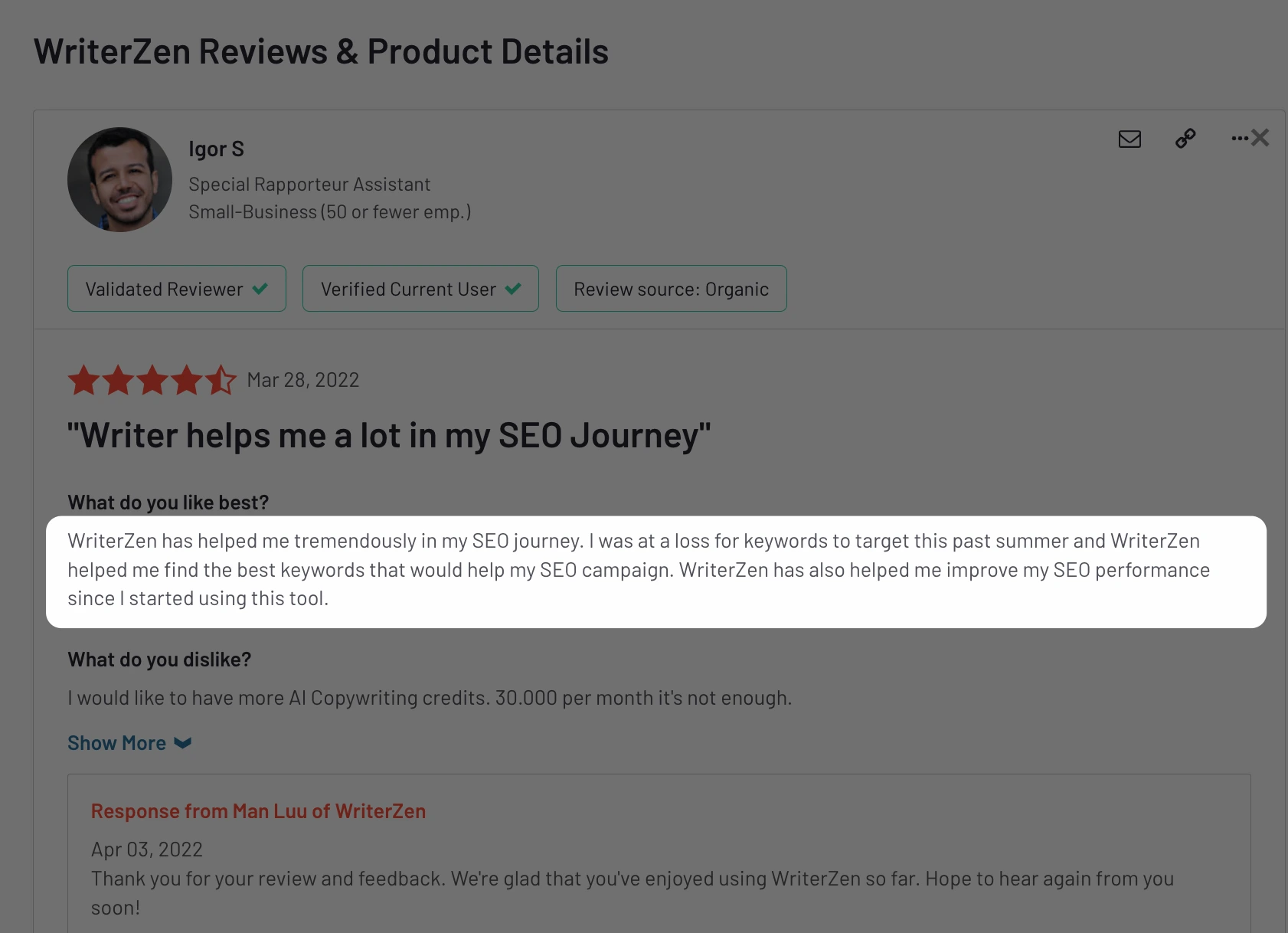
[WriterZen review on G2]
Since you’re still here, we assume you’re bent on understanding keyword revenue forecasts. So, let’s see how WriterZen helps you forecast keyword revenue to target the right keywords so you can forestall disappointments.
Introducing WriterZen’s Revenue Forecast Indicator
Despite ranking in top positions for certain keywords, companies still fail in business when their sales don’t meet their expectations.
But even without running paid ads, you can generate revenue just as your content ranks by simply estimating sales from your keywords.
WriterZen developed a metric for this. It’s called Revenue Forecast.
With this feature, you can easily estimate the sales you could get when a keyword ranks in the top ten positions of search engines, using this formula:
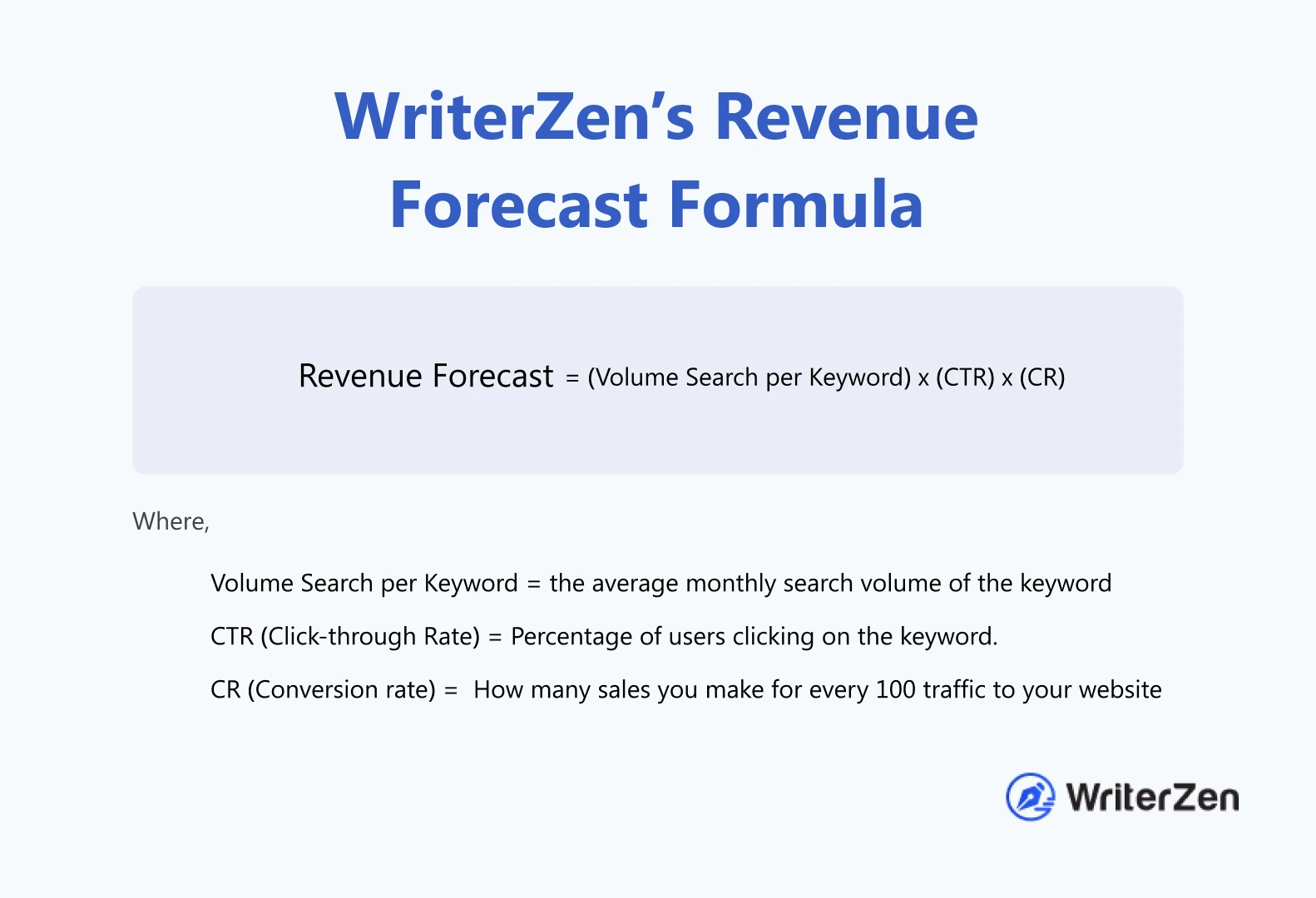
Revenue Forecast is a fundamental metric that helps you identify (and choose) the right keywords for your campaign. It gives you a realistic way to judge the effectiveness of your target PPC or SEO keywords beyond search volume, CPC, and other metrics.
Here’s a use case for the formula:
Say you run a business that sells a product called “golf clubs set,” and your goal is to earn $100,000/month.
So, you input your keyword into an SEO tool to get the search volume:
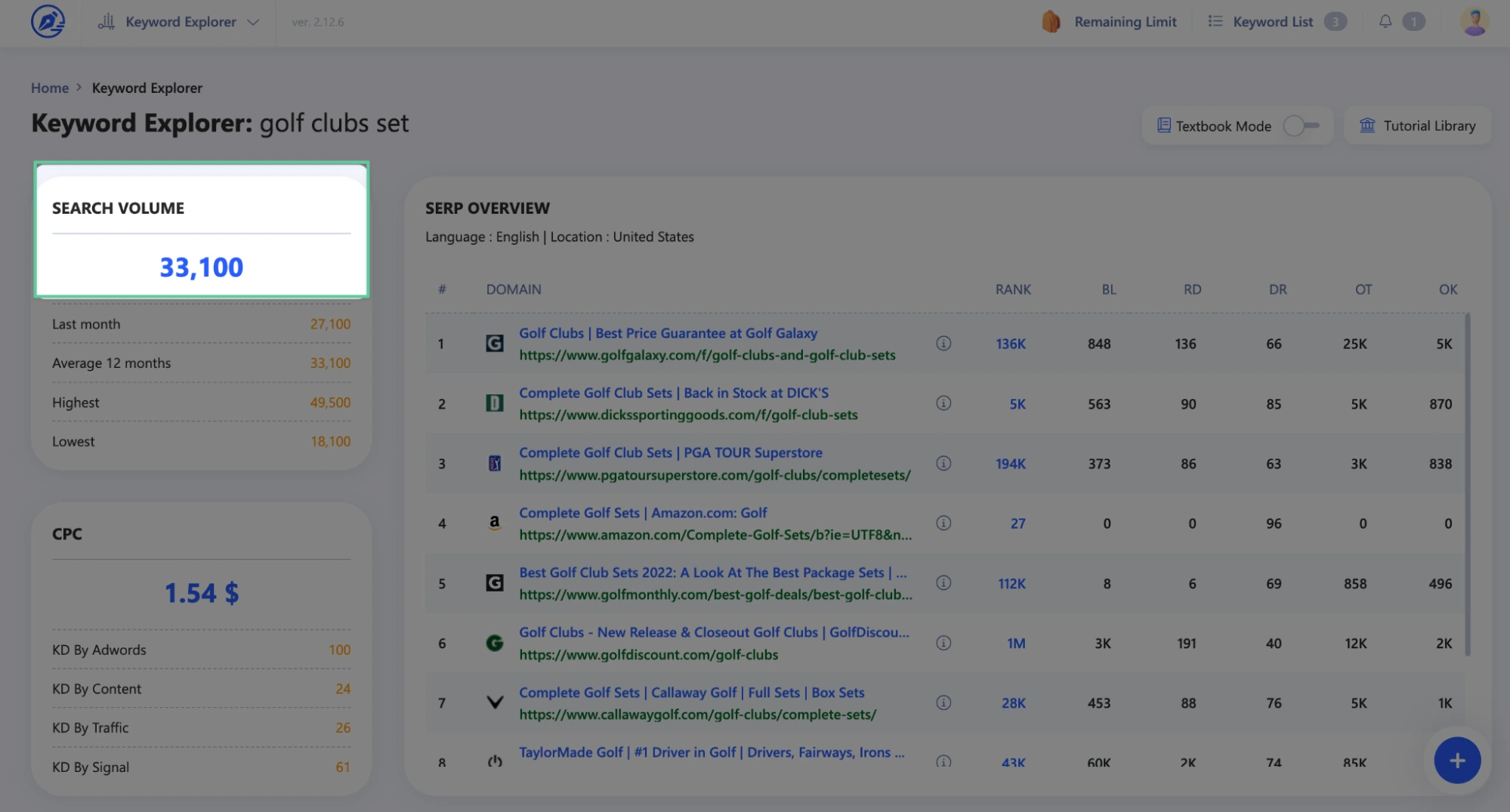
And then, you move on to apply the formula.
Not so fast, though.
Remember you need the click-through rate and conversion rate data, too. And the data for conversion rates vary depending on:
- The type of website you run
- The definition you’re putting as conversion (whether as a product or a service)
- How well your website is optimized
Your CR can fall between 3-4% if your website is well-optimized. But if it isn’t, 0.2- to 1%.
This data should come from your website history. But we’ll use a CR of 3% (gotten from a campaign we ran for a similar business) for our golf example.
Now that that’s settled let’s proceed to the CTR data.
Unfortunately, you can’t get CTR data unless you run Google ads and measure them yourself. And that’s more time and energy you’ll expend.
It’s why WriterZen did the homework for you.
We measure CTR data from Google Organic CTR History to create our own CTR benchmarks by industry.
For instance, the average CTR for search conducted on a desktop are:
- 29% for top one,
- 10.78% for top three,
- 5.07% for top five,
- 1.74% for top ten.
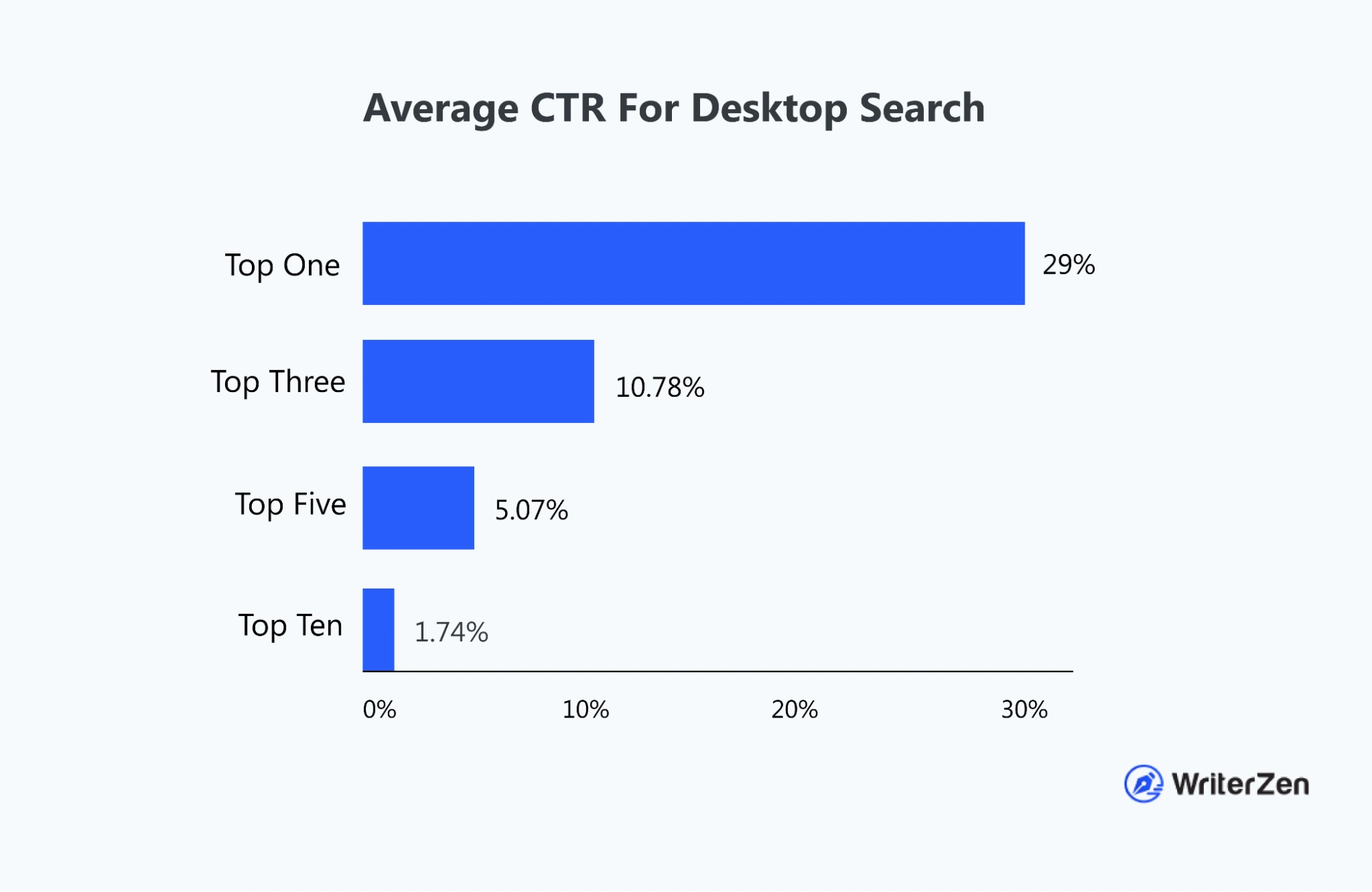
The top one above includes the No.1 advertising or organic results.
WriterZen continuously updates this average CTR data to be accurate enough for forecasts. Going by that, here’s the sales estimation for your keyword “golf clubs set” on different SERP positions, using the formula shared earlier:

- If it ranks on top 1 =33100 x 29% x 3% = 288
- For top 3 =33100 x 10.78% x 3% = 107
- For top 5 =33100 x 5.07% x 3% = 50
- For top 10 =33100 x 1.74% x 3% = 17
By implication, if you launch a campaign for the keyword “golf clubs set” and the price of your product per unit is $389, in one month:
- If the keyword holds the average top 1 position, you can sell about 288 sets and make $112,032.
- For the top 3 average positions, you can sell about 107 sets and earn $41,623.
- For the average top 5 positions, you can sell about 50 units and earn $19,450.
- If the keyword ranks for the average top 10 positions, you can sell about 17 units and earn $6,613.
Now, imagine “golf clubs set” wasn’t the only product you sold, and you wanted to run a campaign for 100 more of them. Or maybe you had tons of keywords to target and wanted to be sure they’d bring in money for you.
How back-breaking would it be to calculate the revenue forecast for each of them!
That probably got you querying…
What If You Skipped the Calculations?
You may not be a lover of math.
And even if you were, you’ve got a lot on your neck to spend time estimating profit for the tons of keywords on your list.
Instead of that, how about a tool that doesn’t just give you CTR data but also carries out keyword revenue forecast for you?
That's where WriterZen involves how to do keyword research for content marketing.
And the best part is you'd not only get sales estimates for your seed keyword alone. You’ll also get related keywords with their revenue forecasts, so when you include them in your content, they double your chances of ranking faster.
Below is how it works.
First, input your seed keyword into WriterZen’s Keyword Explorer. Let’s maintain the keyword “golf clubs set”:

Then you toggle at the Revenue Forecast Button.
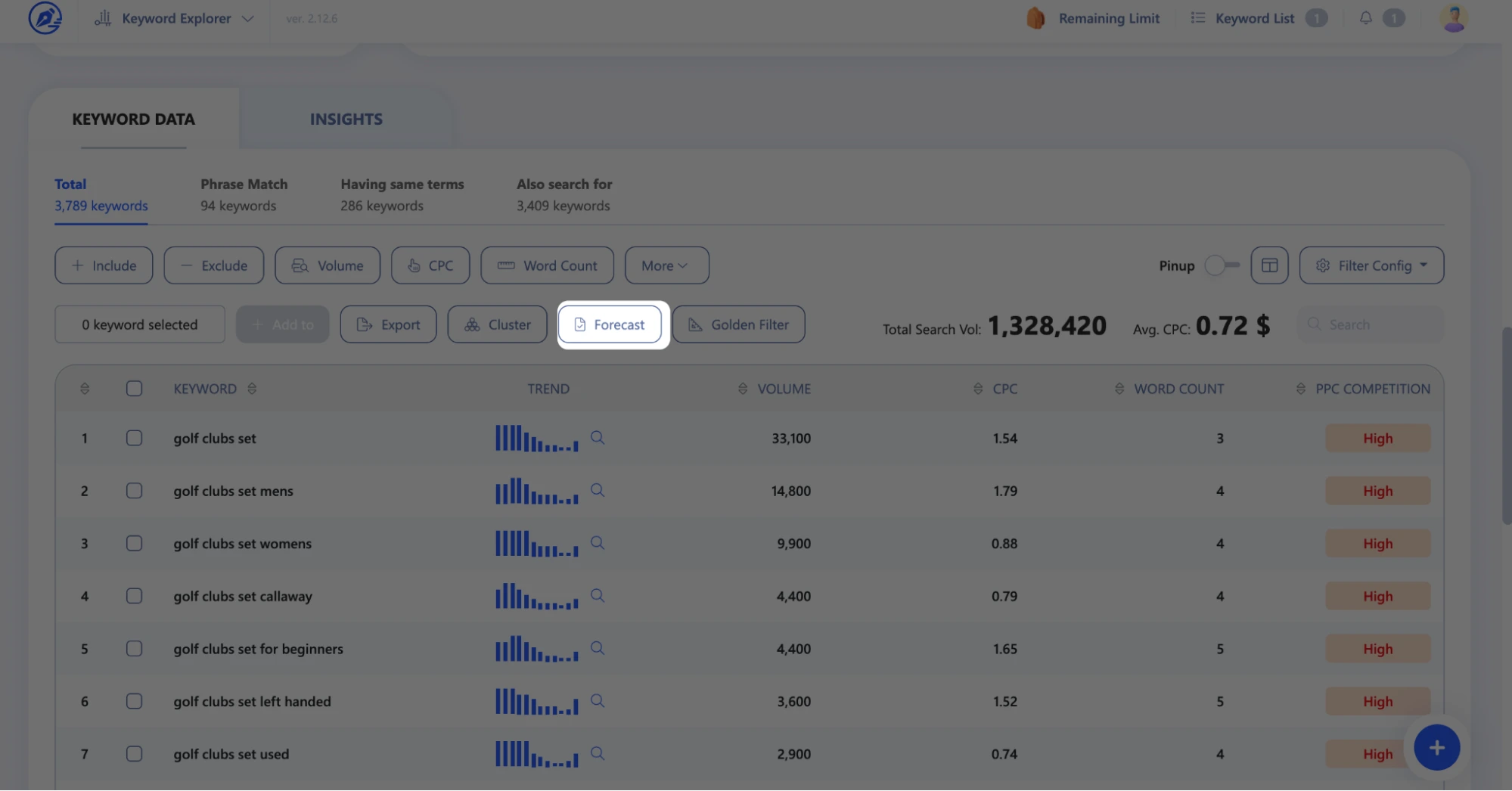
Immediately, you’ll see this:
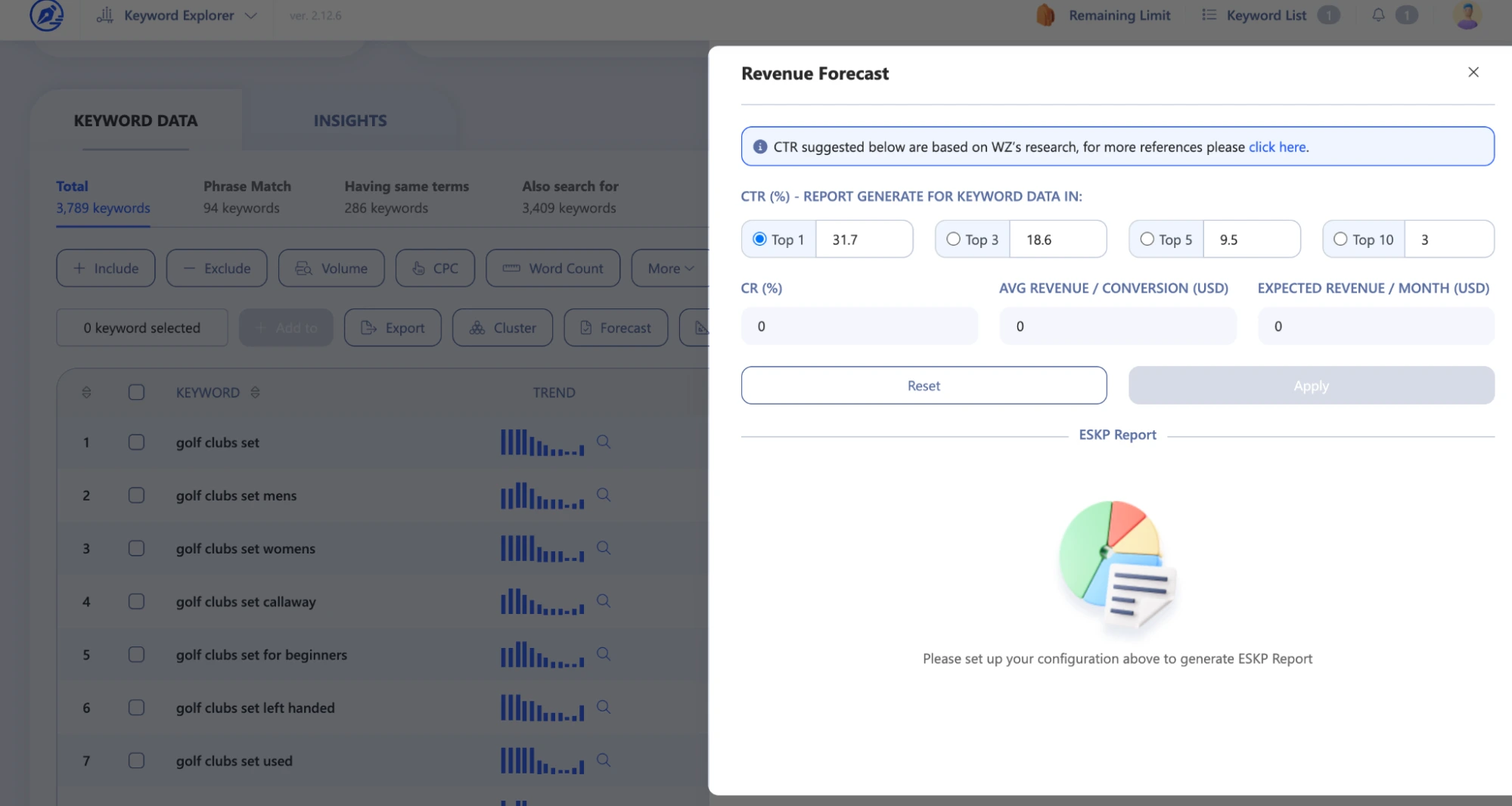
You can either work with the CTR data we already filled for you or replace them with more accurate numbers for your business.
Then proceed to configure the tool with your conversion rate, average revenue per conversion, and expected monthly income.
Once you do so, you’ll get a report that estimates the traffic, sales, and revenue you’d get from ranking top one for “golf clubs set” and 3789 other related keywords:
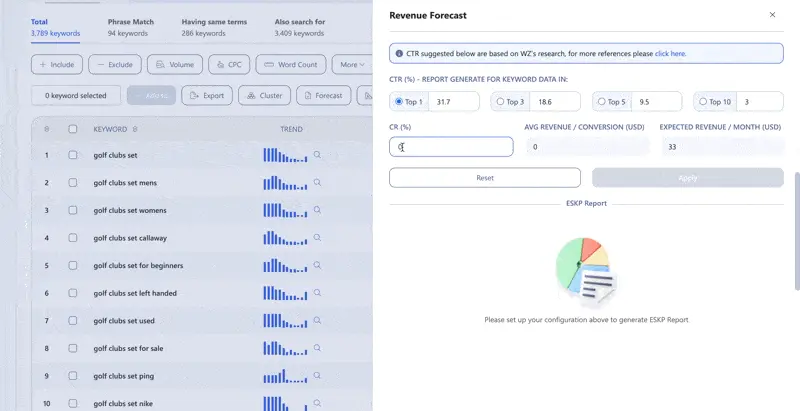
Toggle the buttons of the other positions to see how much you’d get ranking in the top three, five, and ten positions:
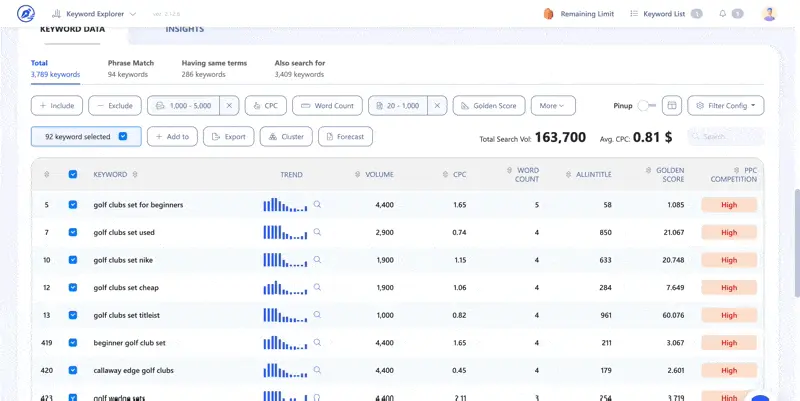
Hit “Apply”, and the tool will forecast the number of sales each keyword would give to arrive at your estimated revenue:
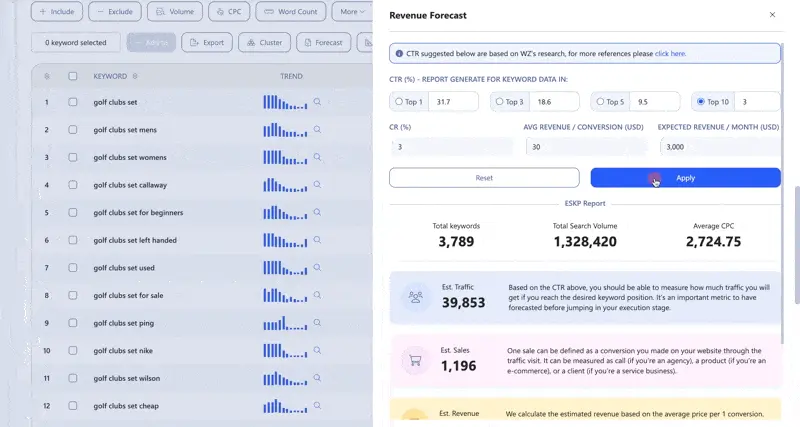
For more specific results, do some filtering right on the “Keyword Data” tab and pick the keywords you’re more interested in estimating their sales potential.
You can filter functions like the search volume or the allintitle to find keywords with low competition. Doing that will reduce the number of keywords for your financial planning.
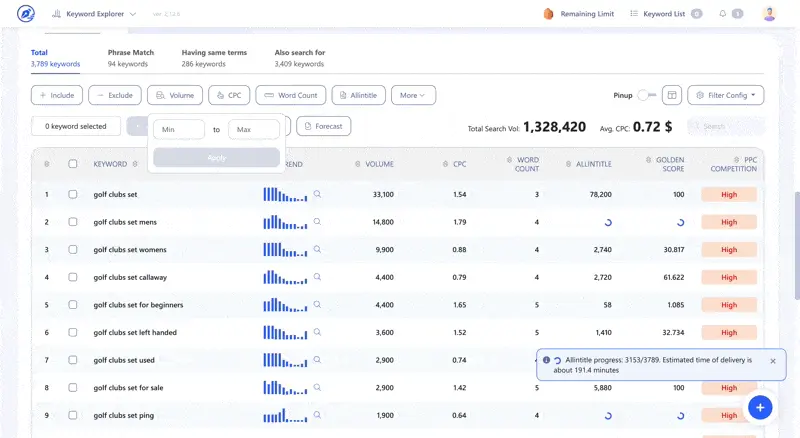
Then add them to a list and run a forecast for them.
Take a look:
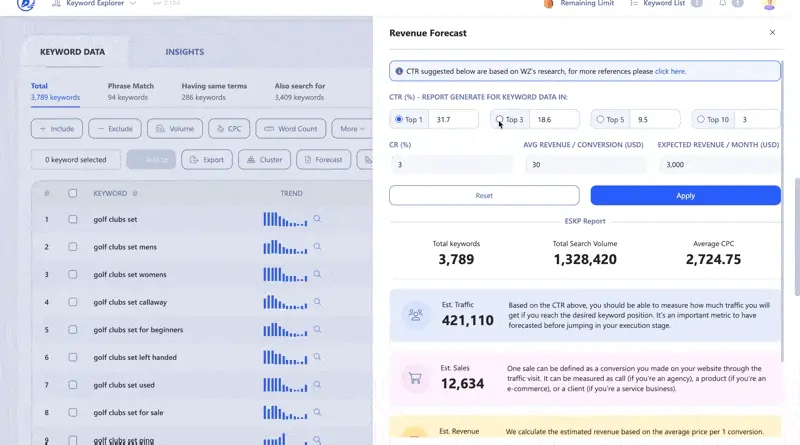
We detailed how forecasting keyword revenue with WriterZen works in this webinar.
Watch the replay here:
Predict Your Keywords’ ROI Before You Leap
According to Directive Consulting:
“Businesses need to know how many sales they are likely to generate in a given time period to ensure that they are positioned to meet customer expectations for quality and service.”
Do you want to ensure creating content that meets your customers’ expectations also meets your financial goals?
Try WriterZen’s Revenue Forecast.
It helps you quantify the effectiveness of your keywords beyond organic rankings alone but by revenue estimates, too.
The best part is you don’t need to rack your brain for this. Simply enter your keyword, toggle some buttons, and your forecast report is ready.
Although the Revenue Forecast report is only an estimation. It shows you how to prioritize keywords based on possible revenue outcomes.
For instance, a seer that gives you a financial projection of your SEO ROI. So, stop running blind Google ads or SEO campaigns. Estimate how much you’d likely make from ranking keywords on top SERP positions before you leap.
Others are already trusting WriterZen for this:
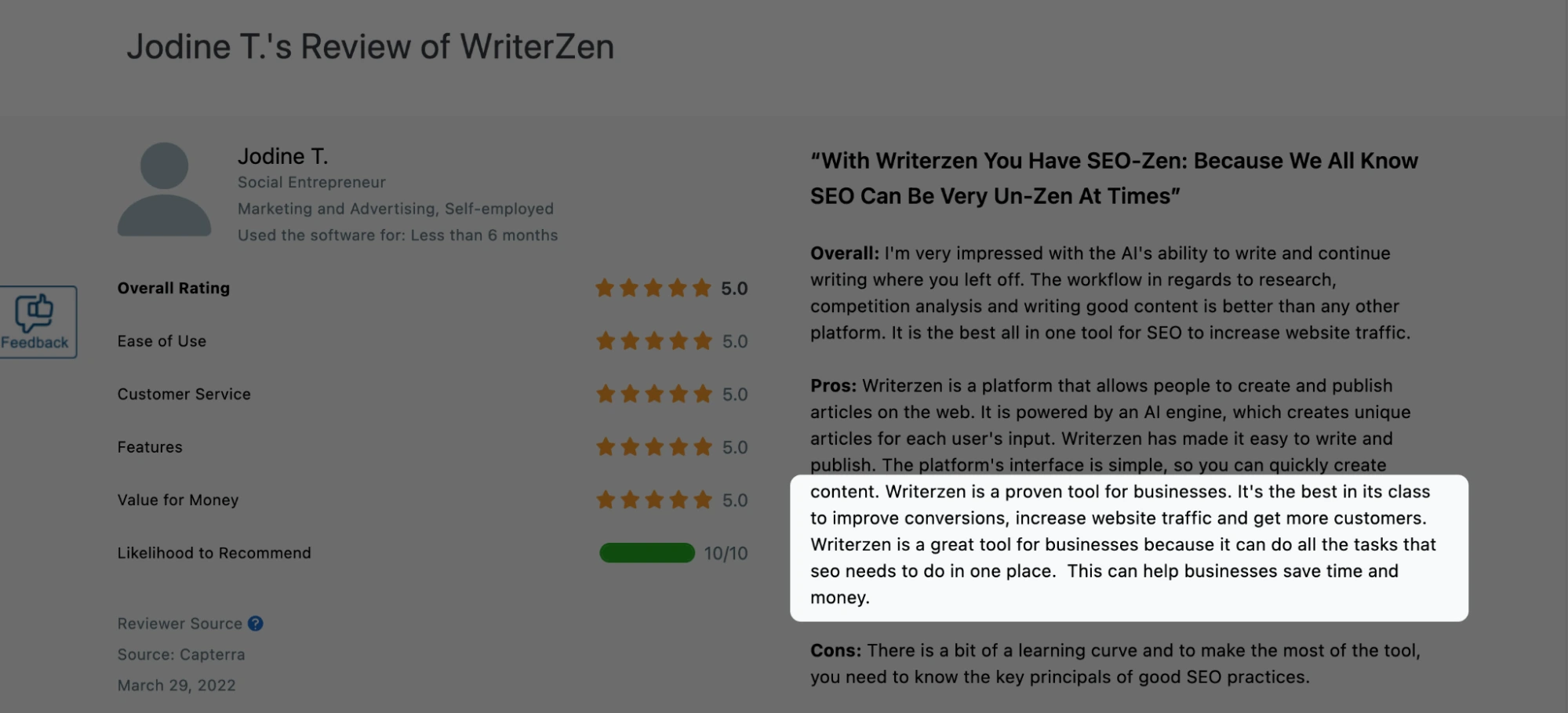
WriterZen review on Capterra


